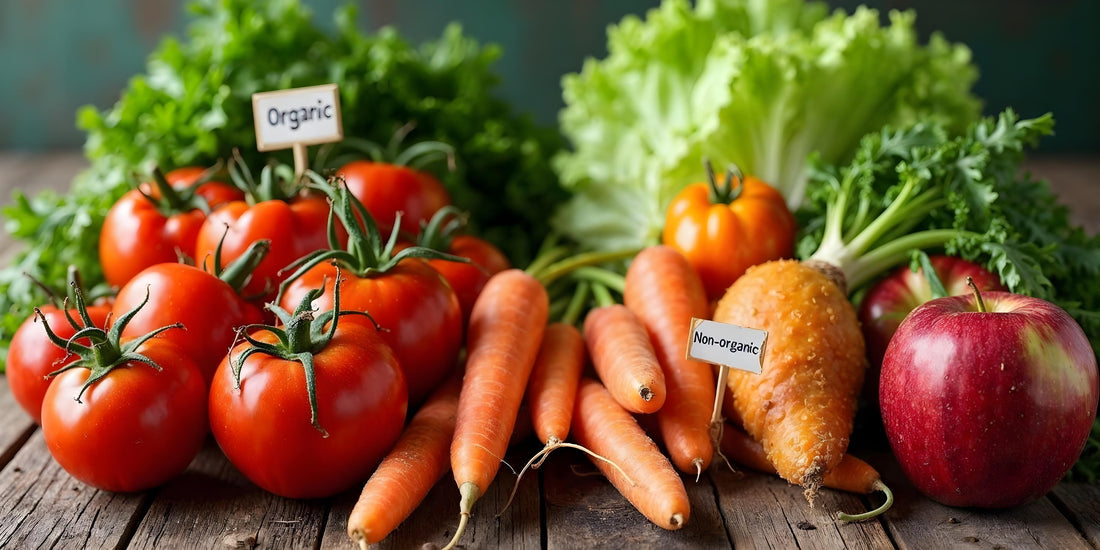
Organic vs. Non-Organic Food, A Comprehensive Comparison
Share
Organic vs. Non-Organic Food: A Comprehensive Comparison
In the quest for healthy living, the debate between organic and non-organic foods continues to be a hot topic. With growing awareness about food quality and its impact on health and the environment, understanding the difference between these two categories is essential. Let’s explore how organic food stacks up against non-organic food in terms of health, nutrition, environmental impact, and cost.
What Is Organic Food?
Organic food is grown and produced without the use of synthetic pesticides, chemical fertilizers, genetically modified organisms (GMOs), or artificial additives. It relies on natural farming practices like crop rotation, composting, and biological pest control, ensuring a more eco-friendly and health-conscious approach.
What Is Non-Organic Food?
Non-organic food, also known as conventional food, is grown using modern agricultural methods that often include synthetic chemicals, GMOs, and artificial preservatives. These methods are designed to increase yield, extend shelf life, and reduce costs.
Key Differences Between Organic and Non-Organic Food
1. Farming Practices
Organic: Organic farming focuses on natural methods, such as using compost and manure for soil fertility and relying on natural pest control. These practices promote biodiversity and environmental sustainability.
Non-Organic: Conventional farming relies heavily on synthetic fertilizers, pesticides, and herbicides to maximize crop yield. These methods can lead to soil degradation and environmental pollution.
2. Nutritional Value
Organic: Studies suggest that organic foods often contain higher levels of essential nutrients like vitamins, minerals, and antioxidants. For example, organic fruits and vegetables tend to have more vitamin C and phenolic compounds, which are beneficial for health.
Non-Organic: Non-organic foods may have lower nutrient density due to chemical farming practices that prioritize yield over nutritional content.
3. Chemical Residues
Organic: Organic foods are free from synthetic pesticide residues, making them a safer choice for consumers, especially children and pregnant women.
Non-Organic: Non-organic foods may contain traces of chemical pesticides and herbicides, which can pose long-term health risks.
4. Environmental Impact
Organic: Organic farming is eco-friendly and helps preserve soil health, reduce water pollution, and protect biodiversity. It also uses less energy, making it a sustainable choice.
Non-Organic: Conventional farming methods can lead to soil erosion, water contamination, and a decline in biodiversity due to the heavy use of synthetic chemicals.
5. Taste and Quality
Organic: Many people find that organic foods have a fresher, more natural taste due to the absence of artificial enhancers and their slower growth process.
Non-Organic: Non-organic foods may lack the depth of flavor found in organic produce, as they are often grown quickly with the help of synthetic inputs.
6. Cost
Organic: Organic foods are typically more expensive due to higher production costs, smaller yields, and labor-intensive farming practices.
Non-Organic: Non-organic foods are more affordable because of large-scale production and the use of cost-efficient farming techniques.
Which Should You Choose?
The choice between organic and non-organic food depends on your priorities and budget. If health, environmental sustainability, and taste are your primary concerns, organic food is the way to go. However, if cost and accessibility are more important, non-organic food might be a more practical choice.
Tips for Choosing the Right Food
- Prioritize Organic for Certain Foods: Focus on buying organic for produce that is prone to high pesticide levels, like strawberries, spinach, and apples.
- Mix and Match: Combine organic and non-organic options to balance health and budget.
- Buy Local: Local produce, even if not certified organic, is often fresher and less likely to contain preservatives.
Conclusion
The debate between organic and non-organic food boils down to personal preference, priorities, and budget. Organic foods offer numerous benefits, from better health and taste to reduced environmental impact. Non-organic foods, on the other hand, are more affordable and widely available but may come with compromises in quality and sustainability.
By making informed choices and striking a balance, you can enjoy the best of both worlds while taking a step toward a healthier and more sustainable lifestyle.
